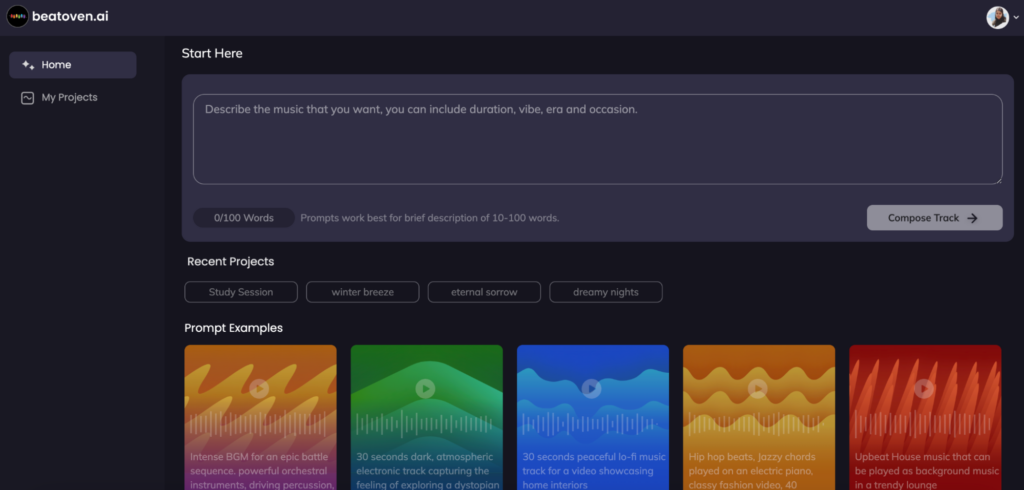Can’t decide between Suno and Mubert as your AI music generator? Suno is already all over the news, with many lawsuits against this brand. The major complaint against Suno is that the brand used copyrighted music to train its AI models.
Mubert, on the other hand, is known for generating repetitive tracks with fewer customization options. But this is just surface-level information. There is more to the story.
In this blog post, we will discuss Suno vs. Mubert in detail and suggest a great alternative to both Suno and Mubert. Stay tuned till the end.
TL;DR
Overview of Both Players in the Suno vs. Mubert Faceoff
Suno
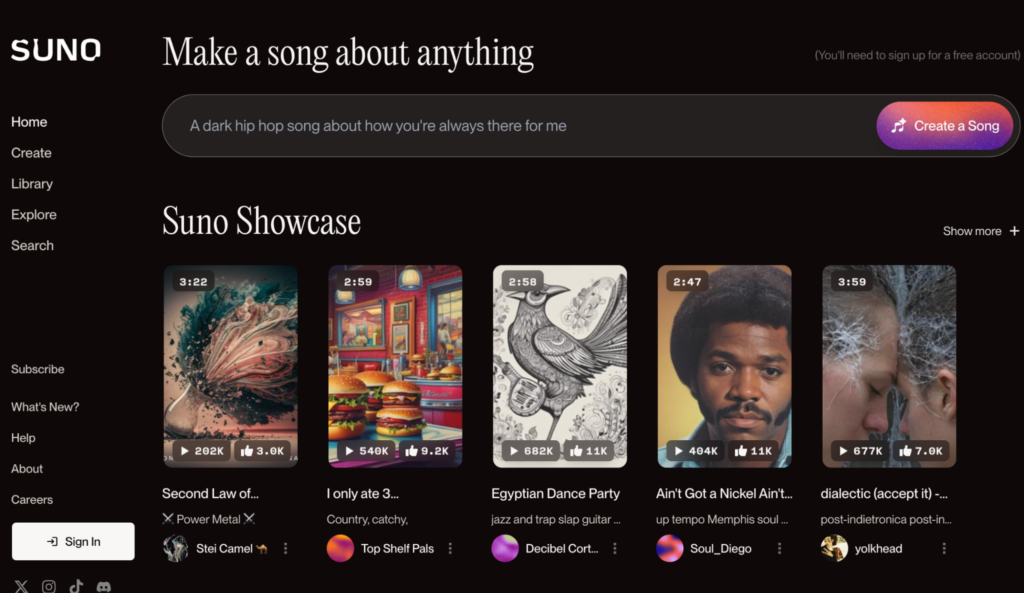
Suno is an AI-based music generator that creates lyrical songs. Its user-friendly interface allows you to generate music through text prompts, produce vocals and instrumental tracks, and complete songs in various genres and styles.
You can also upload a music stem and create new music that matches the style of the uploaded track.
Know about the Suno alternatives here.
Mubert
Mubert, another AI-powered music generator, offers various tools for creating custom soundtracks. It offers Mubert Render to generate tracks, Mubert API to integrate it into your software, and Mubert Tunes Play for AI tunes.
It also allows artists to monetize their samples, riffs, and loops by contributing them to Mubert and transforming them into AI-generated tracks.
Find Mubert alternatives here.
Suno vs.Mubert Comparison: The Ultimate Faceoff
We thoroughly reviewed the features and user feedback for the Suno vs. Mubert comparison, and we identified these as the most crucial decisive factors:

Suno vs. Mubert: Which tool is claim-free for copyright?
When it comes to copyright claims, both tools claim to offer royalty-free music tracks. However, when it comes to delivering, Mubert is slightly better.
Suno fails at delivering claim-free music. It is facing a major legal case for copyright infringement with the Recording Industry Association of America® (RIAA), which accused Suno of using copyrighted music without permission to train its AI. The allegations suggest that Suno replicates the unlicensed copyrighted music to generate output and demands a penalty of $150,000 for each instance of unauthorized use.
Besides this, songs generated using Suno receive copyright claims even when you write your lyrics and use Suno to generate the tune.

Source
Mubert, on the other hand, has not faced copyright claims for the music generated. However, users don’t get any copyright for the music generated using the tool. Instead, Mubert solely holds the copyright for the music.
Suno vs. Mubert: Which tool is better at generating music?
Suno and Mubert share similar challenges in music generation, generating similar-sounding music.
Suno creates instrumental tracks and lyrical songs. Now, it struggles to differentiate between genres like heavy metal, death metal, etc., and generates generic music.
“ Sometimes it’s all good, but I’m also noting a large percentage of “hard rock” and “metal” guitar prompts come out sounding like a violin, which is definitely not what I am after. Not sure why it sounds like this when a proper guitar sound is possible, evidently”, says a user.
The AI also fails to follow the prompts properly, generating random, repetitive lyrics. It fails to distinguish between chorus, verse, and bridges. It even pronounces the lyrics wrong.
Mubert also has similar issues. It lacks diversity and generates repetitive tracks. The tool depends on a pre-made songlist and keeps generating music that sounds the same, with a few tweaks here and there. The overall quality of the music is also not up to the mark. Mubert also fails to identify music genres and subgenres.
For example, it generated this sample music with this text prompt: “Create a fusion music in Indian classical and guitar-based instruments (Remix).”
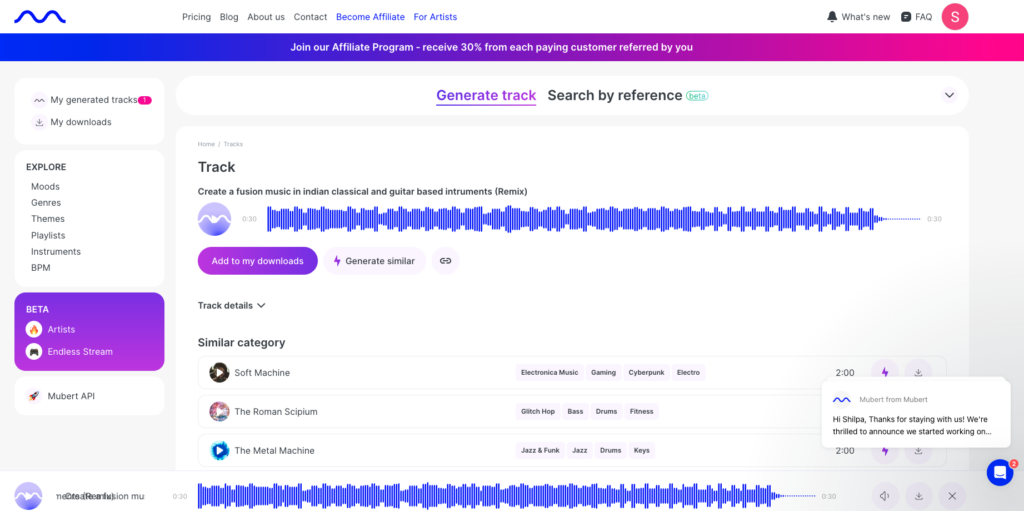
Besides, the feature to upload a YouTube video and generate similar music does not work.
Suno vs. Mubert: Which tool offers better customization?
Mubert has no customization options apart from length, genre, and mood. You only have the text prompt to generate and iterate the songs. If you need advanced customization, you must integrate the Mubert API into your projects, which is a big letdown despite paying such a high price.
Suno customization is also limited to text prompts. You can use the custom mode to add your lyrics, add genres and styles, and assign a track title. Alternatively, you can choose from the list provided. Apart from this, there is no other way to customize your tracks.
Both these tools lack customization features, which can limit content creators who want to add their personal touch to the music generated or change a few things in the track to make it perfect for their content.
Suno vs. Mubert: Which tool is more affordable?
Here’s a quick comparison of the pricing:

Suno offers a basic free plan with a limit of 10 songs and non-commercial terms.
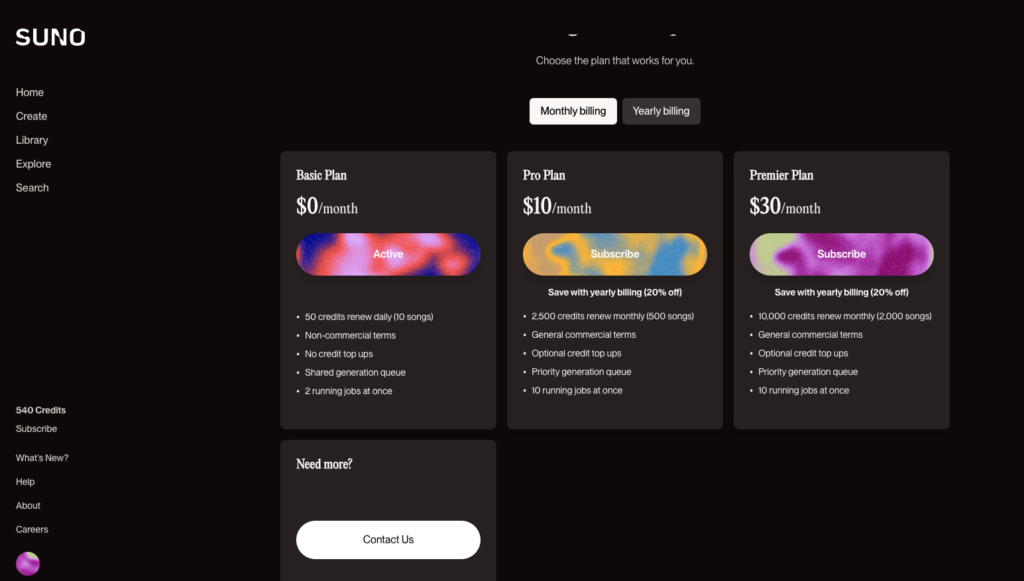
While Mubert’s free plan allows you to generate tracks with watermarks, you need a paid plan to download and use them. The starting plan offers 500 monthly tracks for social and NFT use only.
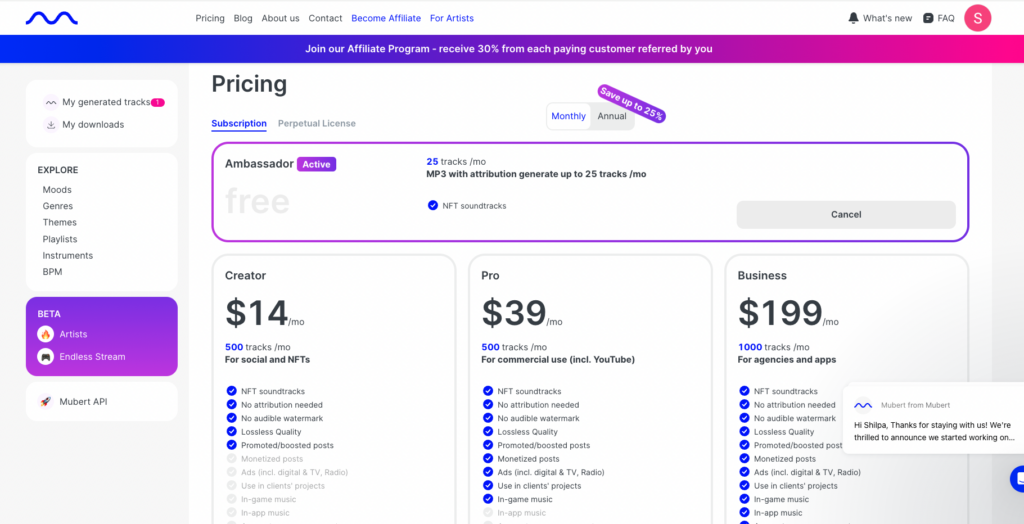
Suno vs. Mubert: Which tool has better app/tech functionality?
Suno and Mubert work pretty similarly when it comes to app functionality.
Suno users complain about the design and hidden commands, which restrict their ability to use the tool to its full potential. Server issues, background noises, and songs disappear from the Create section, a major letdown for Suno users.
The UI soon becomes crowded with imperfect tracks that it keep regenerating.
Mubert experiences issues when generating multiple tracks. The system hangs while generating five tracks and takes several days to create usable tracks. Track rendering time can stretch for hours–on average, 12-16 hours, which is a lot of time for generating AI music and practically makes it unusable.
Moreover, there are issues with the software, and the UI looks outdated.
Suno vs. Mubert: Which is better at customer support?
None of the tools offers satisfactory customer support.
Suno customer support needs to be more responsive, which frustrates customers. Users also complain about their inability to cancel the subscription despite raising issues with customer care.

Source
According to users, Mubert has very poor customer service. Despite sending emails about the issues, the Mubert customer service team has not responded.
In addition, users report being charged twice for subscriptions in the same month despite canceling them. The company doesn’t provide an invoice, and the customer team does not even take feedback. Check out this invoice template for an example, and the customer team does not even take feedback.
Suno vs. Mubert: What existing users are saying?
Let’s check what users are saying about these tools:
Suno

Trustpilot review: 2.8 (62 reviews)
Some Pros and Cons based on user reviews:
Pros
Cons
Mubert

Trustpilot reviews: 2.2 (9 reviews)
Some Pros and Cons based on user reviews:
Pros
Cons
Suno vs. Mubert: Which AI music generator is better for content creators?
Given that the lawsuit against Suno is against our ethics, we do not recommend it. Using copyrighted content to train its AI raises severe concerns about the risk posed to those who use Suno-generated music for their content. We recommend exploring another Suno alternative.
Mubert does not pose a high risk of copyright claims, but it presents significant challenges for content creators who need high-quality music. It generates poor, repetitive music, has unresponsive customer support, and charges customers twice for subscriptions. We would highly recommend the user to look at similar tools to Mubert.
So, what should content creators use to generate music and avoid copyright issues?
Beatoven.ai: A Great Alternative to Both Suno and Mubert
Beatoven.ai is an efficient alternative to both Suno and Mubert. It offers royalty-free music with a perpetual license and extensive customization, allowing you to create music in your own style.
Beatoven.ai is one of the early adopters of Fairly Trained certification for ethical AI music generation. Its ethical practices in training its AI and generating excellent music output also led it to be recognized as a game-changing AI brand in the Telecom, Media, and Entertainment category at the Nasscom Awards.
In addition to its ethical music production, Beatoven.ai also collaborates with artists and global communities. Recently, it partnered with the AIforMusic initiative, supported by Roland Corporation and Universal Music Group, to support the music community worldwide.
Beatoven.ai’s efficiency and dedication to ethical AI music have earned the trust of brands like Google, which used Beatoven.ai generated music for its event at the Google I/O Connect conference in Bangalore.
Beatoven.ai’s key features include:

Sreyashi Chatterjee is a SaaS content marketing consultant. When she is not writing or thinking about writing, she is watching Netflix or reading a thriller novel while sipping coffee.








